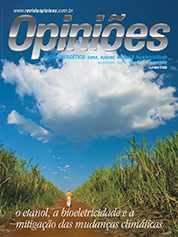Antonio Herman V. Benjamin
Minister - Superior Court of Justice and co-author of several environmental laws
Op-AA-22
Ethanol and Sustainability
Brazilian ethanol today is the object of debate around the world. From major newspapers and TV channels to summit meetings of heads of State, from periodic meetings at FAO and UNEP to arid discussions of climate scientists and noisy meetings of environmental NGOs as well as human rights militants, from spreadsheets of agribusiness representatives and international investors to projections of specialists in energy and biotechnology – nobody is immune to this strategic issue of our time.
Two antagonist risks threaten Brazilian ethanol. On the one hand, is what one might call the edenic vision, i.e., the notion that ethanol is self-explanatory, representing the salvation of mankind, and that it is an economic activity rich in advantages and destitute of problems.
On the other hand, the demonic vision, which sees only malefaction in ethanol, including the destruction of our forests, polluting of air and the indiscriminate slaughter of wildlife through the incineration of sugarcane straw, the contamination of soil and water resources with agrotoxic substances, the utilization of child and slave labor, perversion of the landscape and of biodiversity due to monocultural agriculture, and the radicalization of hunger around the world, through the transformation of land for the production of energy rather than food.
I believe our ethanol can fully overcome both these radical views. Overcome them in an honest way, not with rhetoric or palliative measures. With so much at stake, in terms of a cleaner energy matrix and the generation of jobs and foreign currency, the first step is the renewal of leadership and in the way leaders think.
The transition will not be easy, but it has begun. Entrepreneurial entities, such as UNICA, that in the past saw the environment as a hindrance for the sugar and alcohol industry, nowadays perceive, voiced by respected new leaders such as Marcos Sawaya Jank, that the environmental question is, unlike what used to be the way of thinking, an instrument to strengthen the market and to differentiate ethanol.
There is room here for a fruitful alliance, because, while what is important for environmentalism is to find energy alternatives for oil and coal, for the ethanol production chain too it is important to show that ethanol is fully viable, while respecting biodiversity, Permanent Preservation and Legal Reserve areas, and the quality of water and the air.
Serious sustainability initiatives are taking place throughout the country. Producers are betting on the production of alcohol in harmony with Nature. It is not financially difficult; the difficulty is of a cultural nature. Hence, the need for support from government and also from class entities for these efforts. To publicize them becomes a priority. Good examples are no good if they remain hidden.
They deserve awards, incentives, particularly because they improve the image of the industry as a whole. There is not much time to reinvent the sugar and alcohol industry. To win the contest in the eyes of the world public opinion, first it requires that we do our homework facing our environmental and social debt resulting from the 500-year presence of sugarcane among us, ever since the first colonizers.
It is a mistake to believe that this is a task for an individual, whose beneficiaries would be landowners and large mills. Quite to the contrary. Ethanol, if successful, may place Brazil in the front row of the Planet’s energy sustainability and make Brazilians ambulant energy generators. Whereas the pre-salt layer oil reservoirs and the thermoelectric plants stand for a bet on the technology of the past, ethanol is the alternative of the future, whose limit is only our ambition and intelligence to make it a fuel synonymous of sustainability.
The Judiciary is becoming an important player in the transformation of this paradigm, particularly by showing that the law is there to be complied with by everyone. It is not fair if a landowner implements his or her Legal Reserve and Permanent Preservation areas only to be called naive or prodigal by the neighbors, who continue to exploit the land with no concern about ecological sustainability.
However, one should always remember that true ecological sustainability is not generated in the Courts. As long as the volunteer abiders of the law are the minority, the system as a whole will be viewed as an enemy of the environment – here and in the international markets. It is bad publicity for the industry and, again, unfair for those who are leading the radical ethanol transformation in the countryside.





